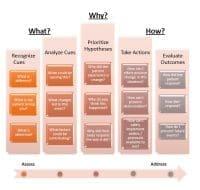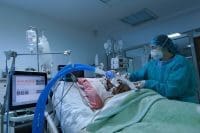December’s guest blogger, Donna Cardillo, MA, RN looks at the future of nursing – where we are and where we are going.
As the world around us changes, the demographics and health care needs of the population are evolving and costs continue to escalate out of control. As a result, the healthcare system in the US is reinventing itself in significant ways to meet the needs of current and future generations. Nurses stand poised to take the lead in the future of healthcare –one of the greatest opportunities presented to us in decades. But are we ready to meet that challenge and seize the day? And if not, what will it take to get us ready?
The Affordable Care Act (ACA) and recent Institute of Medicine (IOM) report titled “The Future of Nursing, Leading Change, Advancing Health” both call for nurses to take on a more active, advanced, and complete role (this refers to all nurses, not just advanced practice nurses) in the planning and delivering of health care in the future. This includes working as primary care partners with physicians, working to the full extent of our license and education, and having our expertise acknowledged, validated, and fully utilized.
While all of this may sound wonderful to nurses, clinical skills and credentials alone are not enough for us to operate at our highest potential. The world will not automatically seek out, much less acknowledge, nurses for their knowledge and opinions. Therefore, even the most experienced and clinically astute nurse must develop additional skills to interact with the population it serves as well as the healthcare community. The mission is analogous to a political movement, requiring both individual and organizational efforts.
Nurses will have to develop business and negotiation skills, including the art of civil discourse. We must learn and master the social graces—the rules of civilized society, become assertive in all communication and interactions, and become articulate and eloquent spokespersons for nursing through writing, public speaking, and everyday conversation. It is necessary to understand not only why networking and relationship building with all healthcare stakeholders is vital to our success as individuals and as a profession, but to learn and master the skills needed to do this effectively. Additionally, nurses need to promote the fact that nurses are healthcare experts in their own right. We must advocate for ourselves as fiercely as we advocate for our patients.
How can we do all of this? By first recognizing the benefit and necessity of it all and then making a commitment to the process. Individually we can accomplish this through reading, taking courses, and continuously working to improve our social, communication, and assertiveness skills. Getting active in professional associations and furthering our formal education also supports this objective.
Our professional associations and employers can include personal and professional development courses in all nursing conferences, conventions, and professional development/education days. Nurses tend to focus heavily, and sometimes exclusively, on clinical education. And yet without also mastering personal and professional development skills and practices, our power and strength as clinicians, advocates, and healthcare leaders will be diminished.
Florence Nightingale, considered the founder of modern nursing, was well educated, socially savvy, well connected, and an adept networker. She was politically active and effective at getting her point across and persuading others to her point of view when necessary. She was tough and outspoken and fiercely passionate about her work and the value of nursing. And while some of today’s nurses possess the same attributes and are well prepared to cross the threshold into Nursing’s future and advance out cause, many of us are not yet there. Therefore, it is the role and the responsibility of those who are, to work to bring the others along.
It’s time to pick up where Flo left off over 100 years ago and renew our confidence, own our power, elevate our standing, and embrace our destiny—all for the greater good. Our time is now. We have been presented with an opportunity. The door has been opened for us. We must rise to the occasion, seize the opportunity and equip ourselves to walk through that door to a brighter, better, more effective and fuller future for all nurses.
Donna Wilk Cardillo is the Career Guru for Nurses and “Dear Donna” columnist for Nursing Spectrum, NurseWeek, and www.nurse.com. Donna is also an ‘Expert’ Blogger at DoctorOz.com. She is author of The ULTIMATE Career Guide for Nurses, Your 1st Year as a Nurse, and A Daybook for Beginning Nurses. Ms. Cardillo is creator of the Career Alternatives for Nurses® seminar and home-study program. You can reach her at www.dcardillo.com.



















3 Comments.
I agree with your assessment that the future of the healthcare industry is ripe for nursing’s involvement to impact change. However, this takes the engagement of practicing nurses. Civic engagement in all areas has dramatically decreased over the past couple of decades. How can we engage nurses today into a voice that will be heard loudly and carry authority? Entry level nursing courses and professional development classes must begin to address this phenomenon to get us to where we need to be.
Nursing leaders are lacking in being united amongst themselves. They are still leading in reactionary rather than proactive ways. They cannot expect the grassroots level to perform duties or work under conditions they themselves would not find acceptable. Nurses leaders still have not found their voices in organizations run by people skilled in business and management.
Professional development has always been a big component of nursing. But I believe its a small piece with regards to the future of nursing. The front line nurses need to have a united voice and not be so divided. Nursing leadership is lacking in uniting nurses and becoming leaders in healthcare. Nurses need to support each other and have the confidence needed to form an opinion. Today most nurses are not able to practice nursing how they were taught in school. This is the reason nurses leave